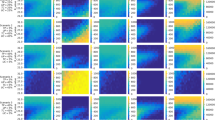Abstract
Assured information sharing among different organizations in a coalitional environment is an important first step in accomplishing many critical tasks. For example, different security agencies may need to share intelligence information for detecting terrorist plots. At the same, each organization participating in the assured information sharing process may have different incentives. In this paper, we explore the effects of different incentives and potential trust issues among organizations on the assured information sharing process by developing an evolutionary game theoretic framework. In addition, we provide extensive simulation analysis that illustrates the impact of various different information sharing strategies.
Access this chapter
Tax calculation will be finalised at checkout
Purchases are for personal use only
Preview
Unable to display preview. Download preview PDF.
Similar content being viewed by others
References
Seredynski, M. Bouvry, P. Klopotek, M.A.: Modelling the Evolution of Cooperative Behavior in Ad Hoc Networks using a Game Based Model. Computation Intelligence and Games, 96–103 (2007)
Cascella, R.G.: The “Value” of Reputation in Peer-to-Peer Networks. In: Consumer Communications and Networking Conference, 516–520. (2008)
Oh, J.C., Gemelli, N., Wright, R.: A Rationality-based Modeling for Coalition Support. Intelligent Systems, 172–177 (2004)
Li, X.: A Grassroots Approach in P2P Reputation Studies. In: Distributed Computing Systems Workshops, p. 234 (2008)
Yi, X., Han, J., Yu, P.: Truth Discover with Multiple Conflicting Information Providers on the Web. IEEE Transactions on Knowledge and Data Engineering, 796–808 (2007)
Eckel, C., Wilson, R.: The Human Face of Game Theory: Trust and Reciprocity in Sequential Games. In: Trust Working Group Meeting (1999)
Morselli, R., Katz, J., Bhattacharjee, B.: A Game-Theoretic Framework for Analyzing Trust Inference Protocols. In: Workshop on Economics of Peer-to-Peer Systems (2004)
Cascella, R., Battiti, R.: Social Networking and Game Theory to Foster Cooperation, http://www.enisa.europa.eu/doc/pdf/Workshop/June2007/Papers/reputation/REP_UniversityTrento.pdf
De Paola, A., Tamburo, A.: Reputation Management in Distributed Systems. In: 2008 IEEE Symposium on Game theory, evolutionary approach, distributed systems (March 2008)
Song, S., Hwang, K., Zhou, R., Kwok, Y.: Trusted P2P Transactions with Fuzzy Reputation Aggregation. IEEE Internet Computer, 24–34 (November 2005)
Agarwal, N.: Equilibrium Game Theory Under the Conditions of Repeatability. In: Proceedings of the 10th International Conference on Extending Database Technology, pp. 240–256 (2006)
Andrade, N., Mowbray, M., Lima, A., Wagne, G., Ripeanu, M.: Influences on cooperation in BitTorrent communities. In: Proceedings of the 2005 ACM SIGCOMM workshop on Economics of peer-to-peer systems, pp. 111–115 (2005)
Axelrod, R.: The Evolution of Cooperation. Basic Books, New York (1984)
Fudenberg, D., Tirole, J.: Game Theory. MIT Press, Cambridge (1991)
Mahajan, R., Rodrig, M., Wetherall, D., Zahorjan, J.: Experiences applying game theory to system design. In: Proceedings of the ACM SIGCOMM workshop on Practice and theory of incentives in networked systems, Portland, Oregon, pp. 183–190 (2004)
Monderer, D., Tennenholtz, M.: Distributed games: from mechanisms to protocols. In: Proceedings of the sixteenth national conference on Artificial intelligence and the eleventh Innovative applications of artificial intelligence conference innovative applications of artificial intelligence, Orlando, Florida, pp. 32–37 (1999)
Myerson, R.: Game Theory: Analysis of Conflict. Harvard University Press, Cambridge (1991)
Riolo, R., Worzel., B.: Genetic Programming Theory and Practice. Kluwer Academic, Boston (2003)
Buragohain, C., Agrawal, D., Suri, S.: A Game Theoretic Framework for Incentives in P2P Systems. Peer-to-Peer Computing, 48–56 (2003)
Gupta, M., Judge, P., Ammar, M.: A Reputation System for Peer-to-Peer Networks. In: Proceedings of the 13th international workshop on Network and operating systems support for digital audio and video, Monterey, CA, pp. 144–152 (2003)
Layfield, R., Kantarcioglu, M., Thuraisingham, B.: Enforcing Honesty in Assured Information Sharing Within a Distributed System. In: Barker, S., Ahn, G.-J. (eds.) Data and Applications Security 2007. LNCS, vol. 4602, pp. 113–128. Springer, Heidelberg (2007)
Kamvar, S., Schlosser, M., Garcia-Molina, H.: The Eigentrust algorithm for reputation management in P2P networks. In: Proceedings of the 12th international conference on World Wide Web, Budapest, Hungary, pp. 640–651 (2003)
Grossman, W.: New Tack Wins Prisoner’s Dilemma. Wired Magazine, http://www.wired.com/culture/lifestyle/news/2004/10/65317
Author information
Authors and Affiliations
Editor information
Editors and Affiliations
Rights and permissions
Copyright information
© 2009 ICST Institute for Computer Science, Social Informatics and Telecommunications Engineering
About this paper
Cite this paper
Layfield, R., Kantarcioglu, M., Thuraisingham, B. (2009). Incentive and Trust Issues in Assured Information Sharing. In: Bertino, E., Joshi, J.B.D. (eds) Collaborative Computing: Networking, Applications and Worksharing. CollaborateCom 2008. Lecture Notes of the Institute for Computer Sciences, Social Informatics and Telecommunications Engineering, vol 10. Springer, Berlin, Heidelberg. https://doi.org/10.1007/978-3-642-03354-4_10
Download citation
DOI: https://doi.org/10.1007/978-3-642-03354-4_10
Publisher Name: Springer, Berlin, Heidelberg
Print ISBN: 978-3-642-03353-7
Online ISBN: 978-3-642-03354-4
eBook Packages: Computer ScienceComputer Science (R0)




